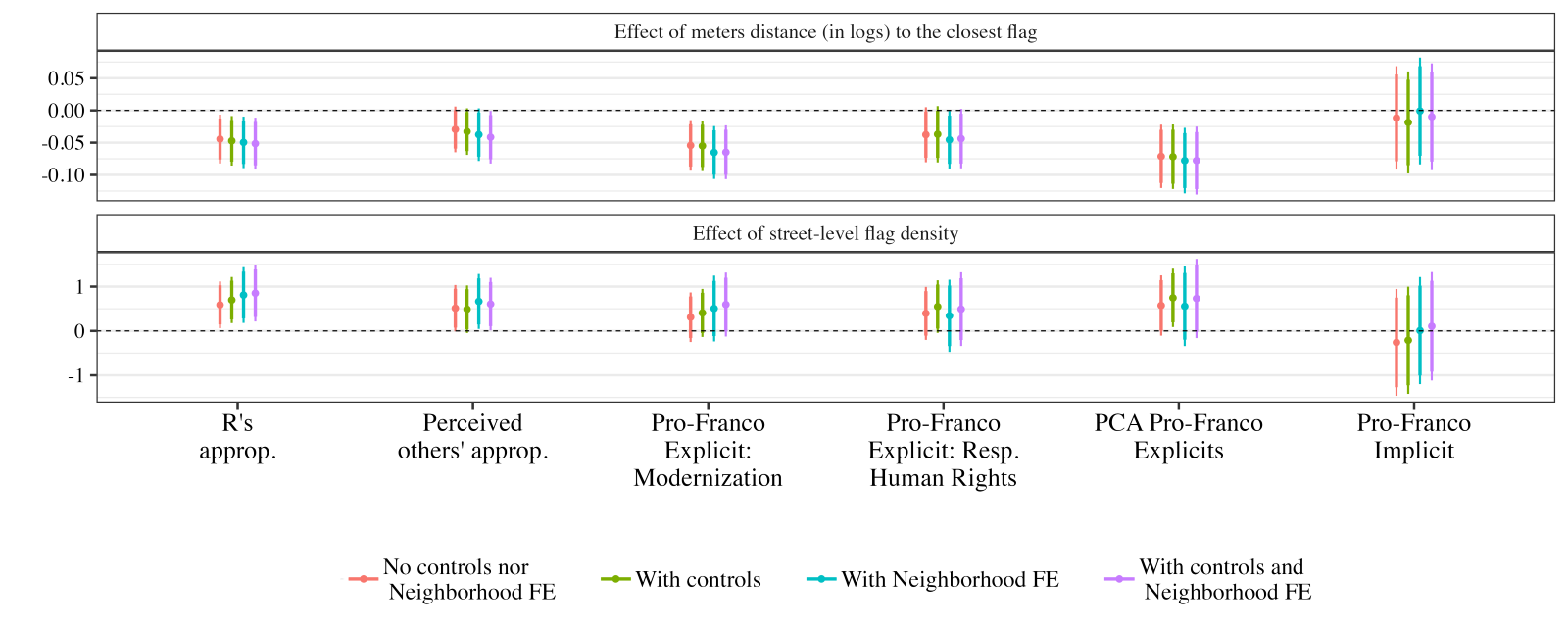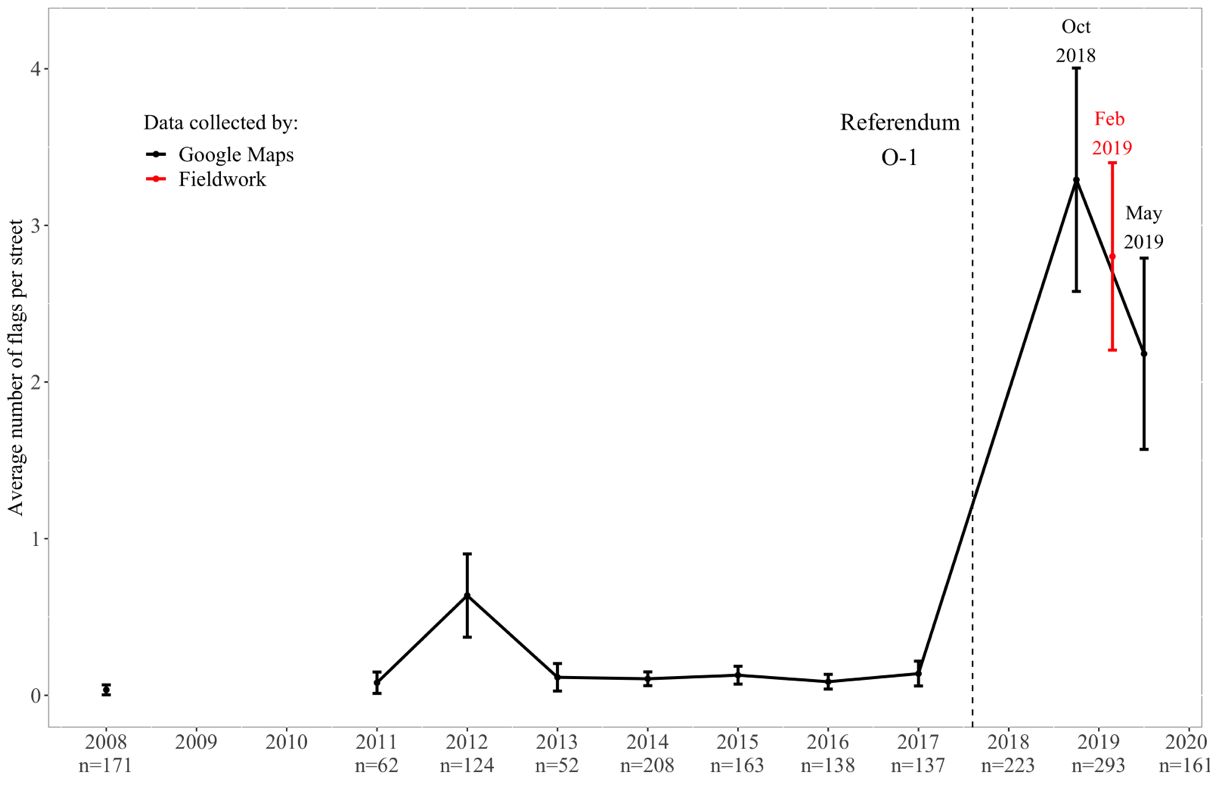In the realm of political science, there’s a prevailing assumption that people’s actions stem directly from their preferences – essentially, what they privately think and desire. Yet, politics is a domain rife with varied perceptions of desirability, where individuals may hesitate to openly express their thoughts to evade social scrutiny and potential isolation. Often referred to as social norms, these perceptions of acceptability can heavily shape individuals’ behavior by deterring political actions viewed as unacceptable.
In a paper recently published in the Journal of Politics, we highlight the impact of social norms on political behavior through an examination of the evolution of expressions of nationalism in Spain. These expressions were closely linked with the authoritarian regime that once governed the country. As a consequence, even individuals who would be otherwise inclined to display nationalist preferences might avoid doing so out of fear of social repercussions.
Our goal in this paper is to highlight how this norm eroded. We begin by documenting a significant surge in the display of Spanish flags on building façades in Madrid following the tipping point of the Catalan independence movement, the October 1 referendum of 2017. We combine in-person observations with coding of Google Maps Street View, which enables us to retroactively examine the appearance of the same streets before and after that date. Figure 1 illustrates the temporal trend in the density of national flags per street during the period spanning the 2010s. It reveals a notable increase in the prevalence of Spanish flags exhibited in windows and balconies, transitioning from negligible representation to exceeding three flags per street after October 2017.
The most obvious explanation for this increase would be that Spanish individuals became more nationalist, but we argue that things were more complex than that. What the process of Catalan independence did was to erode this previously existing social norm against public expressions of nationalism. The process impelled some Spaniards with strong nationalist views to act on them, thus signaling that they did not agree with the social pressure against public expressions of nationalism. From this point on, other people who also disagreed with that social pressure realized that they were not alone and felt more comfortable showing their views. The national flag was crucial for this to happen because it worked as a signaling device, diffusing information about how unpopular the norm really was. In doing so, it helped others who also suppressed their national pride feel more confident in expressing it publicly.
To show evidence of this mechanism, we combine our data on the flags with a survey of the population in Madrid—the capital of Spain. We start with showing that, the closer respondents live to Spanish flags, the more they think it is acceptable to display one—an effect shown in the first two columns (from left to right) of Figure 2. Then, we look at how this change affected the source of the stigma against displays of nationalism: the Francoist dictatorship. Using the same survey, we find that exposure to flags makes individuals more comfortable declaring their support for the late dictator—see the estimates in columns 3 to 5 in Figure 2. The same is not true, however, when we look into a survey item that keeps their answers private (list experiment), as shown in column 6 of Figure 2. This suggests that individuals did not truly change what they thought in private; they just became more comfortable admitting it.

Afterwards, we show that both effects are stronger on right-wing individuals. This is also in line with our argument, because one should expect that individuals of this ideology would have a higher propensity to be nationalist and, as such, to want to move away from a norm against public expressions of that preference. Finally, consistent with the idea that seeing others hanging the flag makes it easier to overcome social desirability concerns, we find that flags cluster in space—even within streets. The more individuals see flags around their residence, the more they think it is acceptable to hang one themselves.
We then check if these effects are driven by an actual change in people’s views. If this were the case, we should expect it to come together with an increase in support for right-wing parties, which in Spain are more nationalist. Our data, however, does not show support for this expectation. Moreover, we also find no evidence that the propensity to hang a flag correlates with concerns for territorial integrity—which one should also expect if it were driven by an actual change in people’s preferences.
Our conclusions suggest that, often, people change their behavior not because they changed their minds, but rather because they come to think that it is more acceptable to act on what they already thought in private. This is especially the case when the views that they have in private are somehow in tension with democratic values. In this paper, we study expressions of nationalism, which were deemed inappropriate in Spain because they were linked to the authoritarian past of the country. Our findings suggest that similar mechanisms can apply to other behaviors at odds with core democratic values. For example, we have witnessed a rapid increase in radical-right and authoritarian behaviors across a number of Western democracies—including protests, crimes, and views expressed on social media. The findings of this paper suggest that such developments may, in part, be driven by individuals who already had those views in private but did not feel comfortable acting on them. In feeling that their views have become more acceptable than they were before, they feel more comfortable showing them in public.
Notes
Figure 1: Average number of national flags in the streets of Madrid, across time.
This blog piece is based on the forthcoming Journal of Politics article “Social Norm Change, Political Symbols, and Expression of Stigmatized Preferences?” by Elias Dinas, Sergi Martínez, and Vicente Valentim.
The empirical analysis has been successfully replicated by the JOP and the replication files are available in the JOP Dataverse
About the Authors
Elias Dinas holds the Swiss Chair in Federalism, Democracy and International Governance at the European University Institute.
Sergi Martínez is assistant professor at EAFIT University’s School of Finance, Economics, and Government.
Vicente Valentim is Postdoctoral Prize Research Fellow at Nuffield College, University of Oxford.


